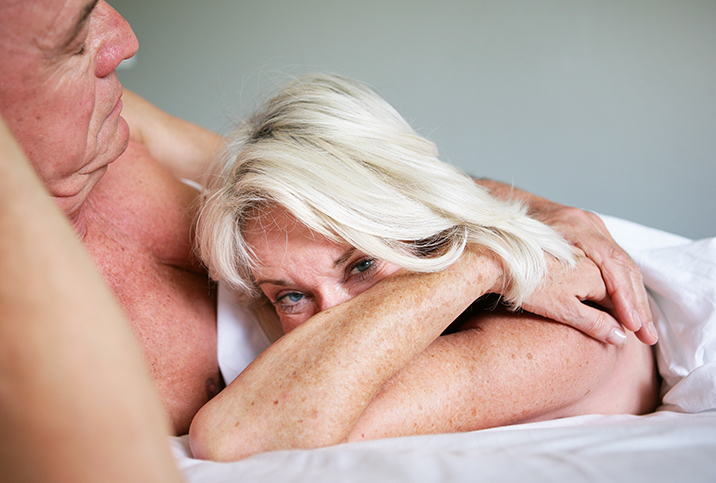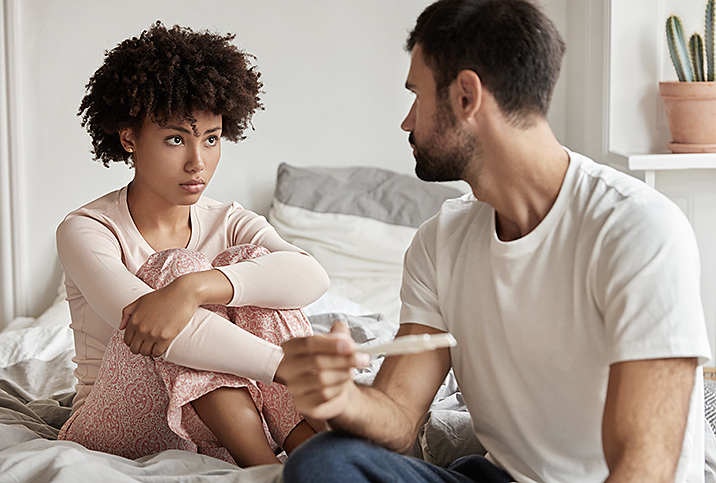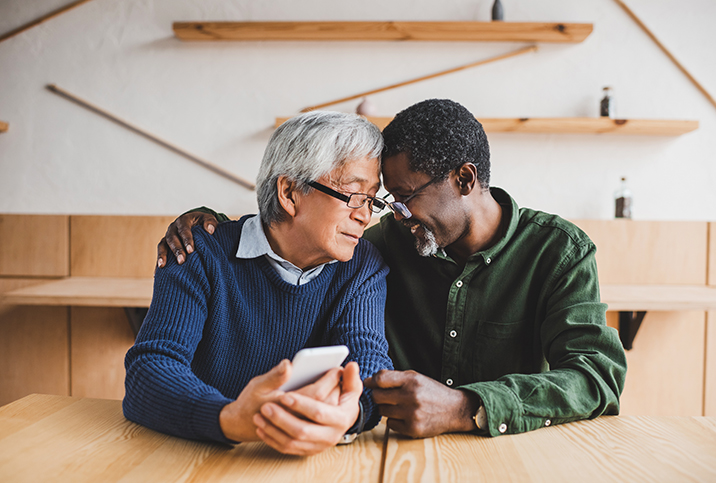Why Is It Still So Hard To Talk About Senior Sex?

Married couple Lynne and George sit bare-faced in fluffy white bathrobes, talking intimately about their sex life in a recent campaign video tackling the stigma around sex and intimacy in our later years. "As we get older we get more experimental because you're fed up of having rice and peas every day," Lynne said as she laughed, with George's arm snaked protectively around her shoulder. "After being married for 53 years, you need to spice it up!"
"Let's Talk the Joy of Later Life Sex" is a project jam-packed with stories like these, conceived by UK charity Relate to challenge the cultural invisibility of "senior sex," a term usually used to describe sex among over-60s. A 2018 Harvard Medical School newsletter attributed a sustained rise in STDs within this demographic to a reluctance to raise the issue [of sex], so campaigns such as this one play a worthwhile role in normalizing conversations about senior sex. But why do we find it so difficult to talk about?
"People say, 'Ew, old people having sex is disgusting,'" laughed Joan Price, the charismatic author of "Naked At Our Age" and self-described "advocate for ageless sexuality," scrunching her face in comedic disgust. "When people say that, I ask: 'At what age do you plan to retire your genitals?'"
For young people, thinking seriously about senior sex also means reckoning with their own mortality.
We often hear surface-level explanations for the stigma around senior sex: We're told we live in a youth-obsessed society, and senior sex is underrepresented in mainstream porn, therefore over-60s are desexualized. These critiques all suggest "ageism" is the main factor at play, yet many of us harbor a deeper, more visceral aversion to senior sex. So what's driving it?
"People think of 'old people' as their parents or grandparents, and nobody wants to think of them having sex," explained Dr. Jacqui Gabb, a professor of sociology and intimacy at the UK-wide The Open University. "It takes you back to that primal scene,"—Freud's term for the experience of children who witness their parents engaging in sexual activity—"and that's not something we want to contemplate. It's forbidden, taboo."
For young people, thinking seriously about senior sex also means reckoning with their own mortality. "Part of the 'ick factor' is that we fear getting old," Price said. "We fear growing into our grandparents' bodies. Because we have a limited idea of what their experiences are or were, we're scared of that for ourselves."
The medicalization of aging also plays a role, Price said: Elderly people are usually represented as nothing but frail and sickly—both decidedly unsexy traits—and this colors their experiences of sexual health care and leads to healthcare bias. "Yes we do have medical issues, but we need our doctors to be more informed," she continued. "If a penis can't have erections, it's not just because of age. Something is preventing that, and it's imperative to find out what it is. Instead, we're told: 'It's because you're old, so stop having sex and leave us alone!'"
Fortunately, there are people working to reduce this bias, such as Sharron Hinchliff, Ph.D., who leads the aging, gender and sexual health research program at the University of Sheffield in South Yorkshire, England. She created Age, Sex And You, an online platform containing frank, nonjudgmental resources for seniors, and Age of Love, a collaborative art project tackling stigmatizing language. "If we start to use celebratory language and narratives that don't uphold negative stereotypes of older people as frail, lonely and dependent," Hinchliff said, "then we'll be moving in the right direction."
Senior sex might always be difficult for young people to discuss or even think about, but that doesn't mean seniors should miss out on comprehensive health care or sexual enjoyment. "I'm 77 years old—hell, even my wrinkles have wrinkles," Price quipped. "But that doesn't mean my body can't give or receive pleasure."

















